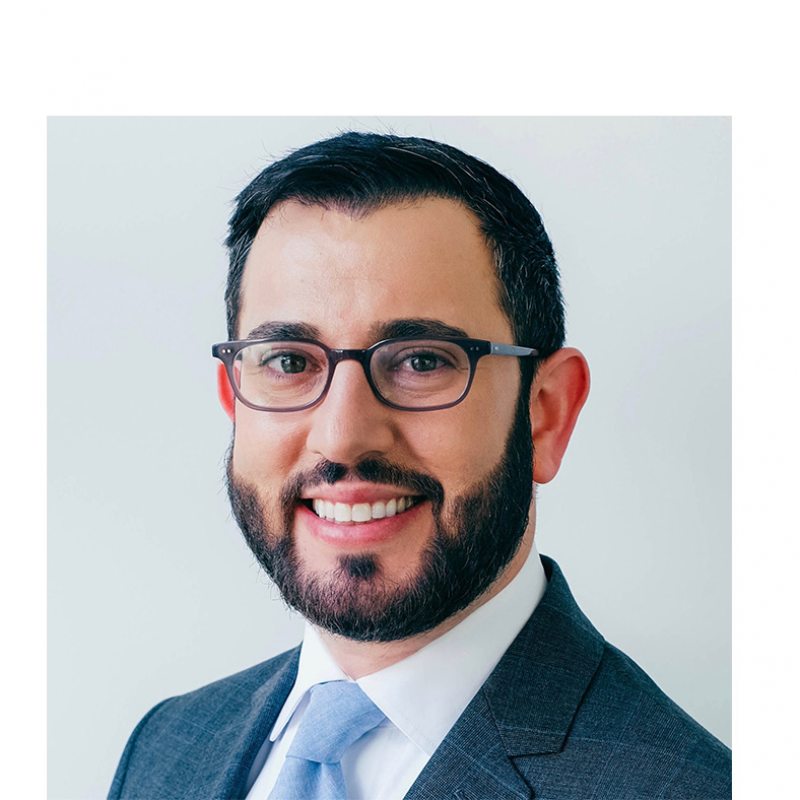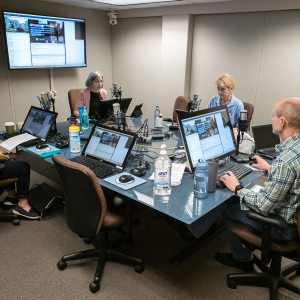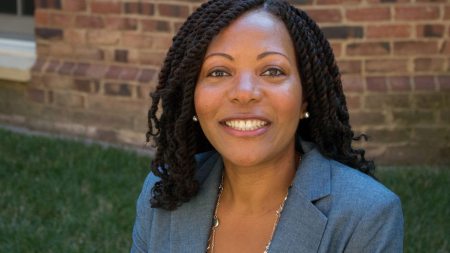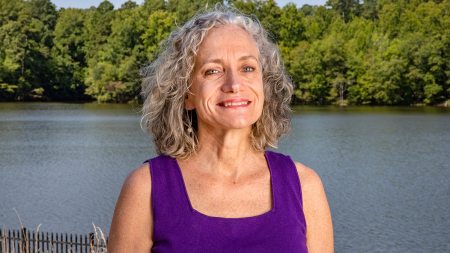Read more about the webinarsLocal government finds help with COVID-19
More than 1,800 county and municipal officials from 56 of North Carolina’s 100 counties tuned in to UNC School of Government webinars to learn how to navigate coronavirus issues in their communities.
A holistic response to COVID-19
The COVID-19 pandemic has left a mark on nearly every aspect of society, from people's physical and mental health to internet infrastructure and emergency preparedness. Finding solutions for the coronavirus' wide-ranging impact extends far beyond the medical labs and doctor's offices.
While many Carolina researchers have been working tirelessly to address the crucial medical challenges, other UNC-Chapel Hill experts are studying the various current and future hurdles caused by COVID-19 to help our state respond to the crisis holistically and help all North Carolinians thrive.
The educational cost of COVID-19
Cassandra R. Davis studies the impact natural disasters have on communities and schools, particularly at the K-12 level. Now the public policy professor is turning her attention to the impact the pandemic will have on first-generation college students, who make up nearly 20% of Carolina’s student population.
“Our overall goal is to analyze the information quickly and get our results out to higher education institutions so they can make decisions on effectively supporting our most vulnerable populations,” Davis said.

Saving lives with public policy
When it comes to the ability to prevent, detect and respond to infectious disease, strong public health policy can mean the difference between life or death. Benjamin Mason Meier is analyzing policies that are being implemented to halt the spread of COVID-19 to understand what powers governments have to prevent the disease and what policies are working in the disease response.
“Until we come up with a vaccine, millions of lives hang in the balance, and policies will determine what happens,” Meier said.

Impacts on essential workers
While gig workers like Lyft drivers and GrubHub deliverers are an essential part of the economy, they are more exposed to the virus and often lack access to health benefits, paid leave and unemployment.
Assistant professor of sociology Alexandrea Ravenelle and a group of graduate students are interviewing 200 precarious workers — gig platform workers, creative freelancers and essential low-wage workers in stores — to uncover how the pandemic is impacting their lives now and, ultimately, in the long term.
“Gig workers are often the canaries in the coal mine for the outsourcing of risk to workers,” she said. “They are very much on the forefront in terms of risk and in terms of being outside the social safety net.”

Supporting communities
The past few months have been trying for all North Carolinians as we've adapted to a new reality in our communities and in our state.
Learn how a UNC-Chapel Hill researcher is working to ease the strain.


Learn more about O’Connell's researchVulnerabilities in diaster recovery areas
How will COVID-19 affect the already vulnerable coastal communities preparing for the 2020 hurricane season? Environmental anthropologist Caela O’Connell studies this question in her new research project.
Learn from our expertsEducation resources for North Carolina
As K-12 schools throughout North Carolina closed at the end of March to prevent the spread of COVID-19, Carolina’s School of Education launched a new online platform that serves as a resource for our state’s teachers, students and parents as they navigate the challenging situation.
A 360-degree view of the pandemic
How stressed should we feel right now?
Carolina professor Jon Abramowitz discusses the impact of the COVID-19 pandemic on our daily lives – including how isolation and social distancing affect our routines.
Inequality amplifies African Americans’ COVID-19 risk
Recent data shows that minorities are more at risk for contracting COVID-19 and experiencing poor health outcomes. In particular, African Americans in COVID-19 hot spots are twice as likely to die from the virus than their white counterparts. Kia Caldwell examines why.
Researchers collaborate to study pandemic’s impact on people with eating disorders
Cynthia Bulik, founding director of the UNC Center of Excellence for Eating Disorders is leading a study with Christine Peat, director of the National Center of Excellence for Eating Disorders, to characterize the impact of the COVID-19 pandemic on people with eating disorders.
Adjusting as internet use spikes under COVID-19
From mid-February to early April, as jobs and schooling moved online, daily internet usage per household increased by 31%. Economics professor Jonathan Williams studies how providers have handled this flux and how different demographics have adapted to these education and work transitions.
Professor leads self-compassion classes to help teens amidst pandemic
Through the UNC Frank Porter Graham Child Development Institute’s Program on Mindfulness and Self-Compassion for Families, Karen Bluth is helping teens address their anxiety and stress.




